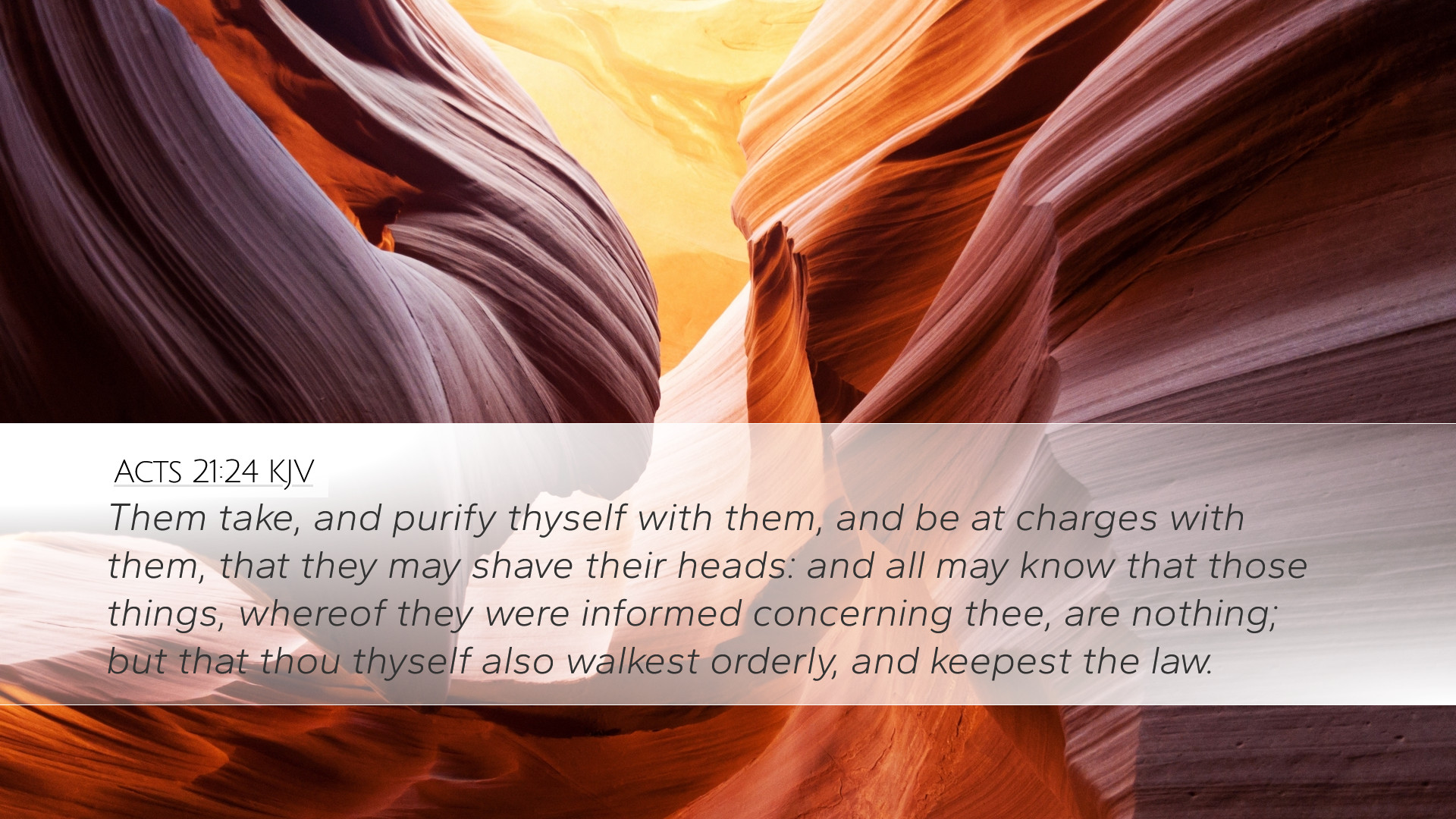Commentary on Acts 21:24
Acts 21:24 reads: "Take them, and purify yourself along with them, and pay their expenses, so that they may shave their heads; and all will know that there is nothing in what they have been told about you, but that you yourself also live in observance of the law." This verse is rich in theological significance and practical implications for believers today. It reflects the Apostle Paul's engagement with Jewish customs and his mission to present the Gospel effectively in a multicultural context.
Contextual Overview
The apostle Paul finds himself in a challenging situation upon his return to Jerusalem. As outlined in the previous chapters, he has been preaching to both Jews and Gentiles. The tensions between these groups have grown, particularly regarding the Law of Moses and the role of Jewish customs in the Christian faith. When Paul arrives in Jerusalem, he faces accusations from certain believers who believe he is teaching Jews to abandon the Law. In this context, the counsel given by James and the elders becomes crucial.
Insights from Matthew Henry
Matthew Henry emphasizes how Paul's actions in this verse demonstrate his willingness to engage with Jewish culture and traditions. Paul does not disregard the Law; instead, he seeks to fulfill it in a way that would not compromise the Gospel's core message. Henry notes that this chapter illustrates the principle of becoming all things to all people, as Paul aimed to avoid unnecessary offense for the sake of the Gospel. He argues that this illustrates Paul's love for the Jewish people and his desire to see them embrace Christ without the burden of unnecessary obstacles.
Insights from Albert Barnes
Albert Barnes provides a deeper analysis of the phrase "Take them, and purify yourself along with them." He argues that Paul’s participation in the purification rites symbolizes his respect for the Jewish customs and a method of promoting unity within the Church. Barnes points out that although Paul is free from the Law, the instruction to perform these rituals indicates his humility and his desire to maintain harmony among believers. He asserts that such actions are not contradictions to the faith but rather a demonstration of love and consideration, which can lead to greater opportunities for witnessing to others.
Insights from Adam Clarke
Adam Clarke takes a unique approach, focusing on the cultural implications of Paul’s actions. He discusses the necessity of understanding the cultural and social nuances that affect ministry. Clarke explains that the act of paying for the expenses of the purification process signifies a deep commitment to community and relationships. It fosters goodwill and dispels rumors, providing a clear testimony of faith in action. Clarke asserts that Paul's motivations demonstrate a critical aspect of Christian leadership — the ability to adapt and demonstrate understanding without sacrificing the truth of the Gospel.
Theological Implications
These commentaries collaboratively reveal a few key theological implications:
- The Law and Grace: Paul's actions reflect the tension between law and grace. While believers are not under the Law for salvation, aspects of it can still serve to demonstrate cultural respect.
- Unity in Diversity: Paul’s willingness to conform to Jewish practices showcases the importance of unity among believers from different backgrounds, emphasizing the need for mutual respect and understanding.
- Practical Theology: This verse emphasizes that theology must be lived out practically. Paul's commitment to pay the expenses ensures that his witness aligns with the core tenets of faith in a real-world context.
Practical Applications for Today
For pastors, students, theologians, and scholars, the insights drawn from Acts 21:24 can inspire practical applications in ministry:
- Cultural Sensitivity: Understanding and respecting cultural differences can enhance ministry effectiveness and lead to greater fruitfulness in evangelism.
- Community Engagement: Practicing generosity and support for others within the community can break down barriers and foster relationships that open doors for sharing the Gospel.
- Adapting Without Compromise: Balancing cultural practices and the core message of the Gospel is essential. Leaders should seek ways to adapt to encourage unity while maintaining the integrity of the message.
Conclusion
Acts 21:24 presents a profound example of how the Apostle Paul navigated cultural complexities while remaining true to the Gospel. The joint insights from Matthew Henry, Albert Barnes, and Adam Clarke illuminate the many dimensions of this scripture, revealing practical steps for living out one’s faith within diverse communities. For modern believers, understanding the importance of cultural engagement, unity, and the practical outworking of faith is crucial, reflecting the heart of Christ in a world that desperately needs the hope of the Gospel.


